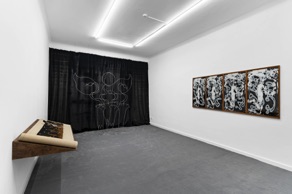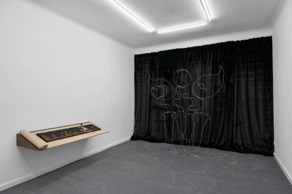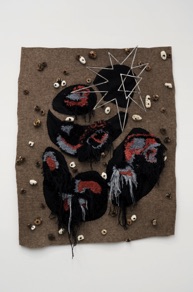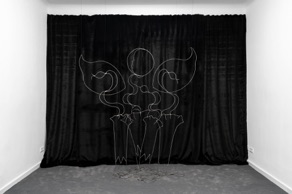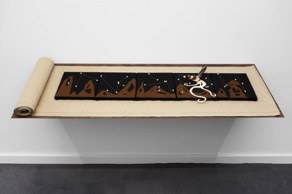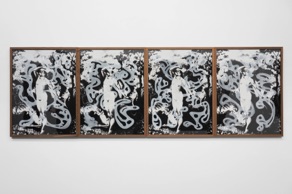ANDRES PEREIRA PAZ
Isabel (in the Warmi Pachakuti)
May 28th - July 17th, 2021
Opening Friday, May 28th, 11am - 7pm
In Isabel (in the Warmi Pachakuti), Andrés Pereira Paz takes as a starting point the life stories of the women in his family – a matriarchy in which the name Isabel has been inherited for three generations – to propose a constellation of four works that reflect upon the life-sustaining labor that in the context of the pandemic has been placed at the center of public debate.
Although since the Sixties feminism has shown that the most important subsidy of capitalism is the reproductive labor performed by millions of women from their homes, it was not until the present global health crisis that an awareness of its centrality spread widely. Today, as we confront death from an unpredictable virus amidst collapsed health systems as a result of decades of neoliberal austerity policies, it is essential to recognize the deep implications of life on Earth and the need to turn care work into a collective project.
In a recent conference entitled Resistances, insurgencies and struggles for life in times of extermination, the Bolivian feminist theorist and activist Silvia Rivera Cusicanqui highlighted the importance of the efforts made by women to mitigate the deadly effects of the patriarchal capitalist system. From pregnancy to breastfeeding, to caring for children and the elderly, among other labors mediated by love, women dedicate their bodies to the preserving of life on a daily basis. According to Rivera Cusicanqui, this historical experience in addition to the moral ruin of the economic system that was recently revealed by the pandemic, set the conditions for the arrival of what in the Andean world is known as a Warmi Pachakuti. This is an ethical and epistemic turn towards the feminine, which puts women and other feminized bodies in the first line of thought and action in the plight to overcome both present and future crisis.
Rivera Cusicanqui’s reflections form the backbone of Andrés’ project. In Isabel (in the Warmi Pachakuti) the artist vindicates the natural, the domestic and the biographical as spaces from which speaking out becomes more vital and effective than ever. Two of the works dismantle the imaginary that reduces nature to an inert and static economic resource. El despertar de la naturaleza (The awakening of nature) consists of a series of interventions on the homonymous painting by the twentieth century Bolivian painter and trade unionist Arturo Borda. In four copies of the original image – in which Borda represents nature as a naked and powerful woman as she awakens – Andrés has drawn different configurations of the kóa smoke emanating directly from the woman’s navel. By focusing on the navel, the artist recalls both the symbiotic unity with the mother, as well as the fundamental role of women in preserving human existence. On the other hand, Una propuesta de mural en homenaje al parlamento de las mujeres (A mural proposal in homage to the parliament of women) is a metal sculpture which reproduces the silhouettes of two flowers, the kantuta and the patujú, which symbolize the union and interculturality of Bolivian people in various national symbols. Intending to question the patriarchal and authoritarian core of national narratives, the artist conceived the piece as an insurrection of the flowers, this time rebelling to pay tribute to El parlamento de las mujeres (The parliament of women). Inspired by The Parliament of Bodies – Paul Preciado’s project for Documenta XIV (2019) in Athens – El parlamento de las mujeres was convoked by the anarchist and feminist collective Mujeres Creando in the face of the democratic crisis that Bolivia went through in 2019. While the streets of La Paz were militarized, a broad and diverse group of women came together to talk about what democracy meant to each of them, preventing the political conflict from taking total control of the social body.
The other two works of an autobiographical nature reveal the personal as deeply political. Retrato de Julia (Portrait of Julia) is a textile piece that reproduces the silhouette of a sculpture that for years decorated the artist's home in La Paz. The constitutive elements of the work were decided upon in an extended dialogue with Julia, a domestic worker of indigenous origins, that raised Andrés and his siblings during their childhood. The Star of David represents her evangelical faith, the star of Guamán Poma de Ayala symbolizes her indigenous identity, and the chuño and the tunta – two types of dehydrated potatoes that have been especially important during the pandemic – represent her daily struggle for subsistence. The artist conceived the piece as a reflection on the "aguayo complex", described by Silvia Rivera Cusicanqui as an affective conflict experienced by Latin American middle and upper-class children, who are raised by an indigenous woman who they love as a mother, but at the same time, feel ashamed due to the prevailing racism. Finally, Isabel (in the Warmi Pachakuti) is an embroidery on jute of an octopus ornamented with a glass eye, pearls, paper, pitahaya and lemon peels. Taking as a metaphorical starting point the octopus – a mollusc whose specificity is to carry the brain in its tentacles – the piece pays homage to the multiple adaptive capacities of the “Isabel” of his family, women who have raised their children regardless of the absence of father figures in an openly macho society like Bolivia.
We are trapped in an inescapable web of reciprocity. The virus has shown that the boundaries of our individuality are porous, that our own health depends on the health of the all. The recognition of this physiological interdependence challenges the ideal of Western individualism which is reinforced by the neoliberal economy, highlighting the urgency of creating communities based on caring. From ritualistic and emotional perspectives rather than purely rational, in Isabel (in the Warmi Pachakuti), Andrés exposes this situation, paying tribute to the long history of women placing life at the center and claiming it as a pillar of the political imagination to come.
Florencia Portocarrero, May 2021
Translated by Luciana Molina Barragán
Andrés Pereira Paz (*1986 en La Paz. Lives and works in Berlin) has extensively exhibited across Latin America, USA and Europe. Recently his works have been featured at 11th Berlin Biennale; Künstlerhaus Bethanien, Berlin; The Ryder Projects and Gasworks, London; Latvian Centre for Contemporary Art, Riga; Kinderhook & Caracas, Berlin; National Museum of Art, La Paz; Second Grand Tropical Biennale, San Juan de Puerto Rico, a.o. He is due to have a solo presentation at Statements in Art Basel with Isla Flotante (Arg) this Fall and is shortlisted for the 6th edition of the Future Generation Art Prize. Pereira Paz is being represented by brunand brunand in Berlin, and Isla Flotante in Buenos Aires.

